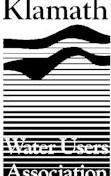
Klamath Water Users Association
Upper
Basin Water Users Attend Two Day Tour with Coastal Fishermen
October 31, 2003
|
|
Klamath Water Users Association Upper
Basin Water Users Attend Two Day Tour with Coastal Fishermen October 31, 2003 |
|
Upper Basin Water Users Attend Two-Day Tour With Coastal Fishermen Twenty Upper Klamath Basin interests – including two Klamath County commissioners and local water users – traveled to coastal areas north of the Klamath River earlier this week to meet with fishing interests interested in achieving common ground. The tour –hosted by the Klamath Fisheries Coalition – provided Klamath Project irrigators and their representatives with an opportunity to see the drastic changes that have affected the fishing-based communities along America’s "Wild Rivers Coast". The fishermen and farmers broke bread together Monday night at a hotel convention center in Brookings, Oregon. Curry County Commissioner Ralph Brown welcomed the group, and provided a PowerPoint presentation describing the Klamath Management Zone, a fishing area that extends from just north of Brookings, Oregon to south of Fort Bragg, California. Personal income from commercial and recreational salmon fishing in this area has dropped from around $32.3 million in the late 1970’s to $1.4 million in 1998, due to a variety of factors, including more rigid state and federal regulations and reduced prices caused by the recent flood of "farmed" fish hitting the markets. Last year saw a slight but encouraging increase in personal income from commercial and recreational fishing of nearly $1.7 million over the 1998 low. Biologist Jim Waldvogel provided an overview of recent Klamath River salmon runs, spawning escapements, and harvests. Chuck Blackburn, a Del Norte County Commissioner and long-time river guide on the lower Klamath River, described his experiences living and working on the river, and emphasized the importance of applying equal scrutiny on both the mainstem Klamath River and the Trinity River, it’s largest tributary. Both Blackburn and Waldvogel expressed their concerns regarding the blame that was quickly placed on Klamath Project operations in the aftermath of the 2002 die-off of salmon on the lower Klamath River, and noted that a combination of uncertain circumstances likely led to the die-off. Brown stressed that cooperation and responsibility, rather than blame and litigation, are needed to develop solutions that help farmers and fishermen. He concluded his presentation by paraphrasing a recent Sacramento Bee editorial - "If there is ever to be peace on the river, we have to work together for a solution," he said. Farmers and fishermen boarded a bus Tuesday morning and traveled up and down the coast, getting a first-hand sense from community leaders of how port towns like Gold Beach, Brookings and Crescent City are trying to adapt to fishing regulations that have taken a large bite out of local commercial fleets. Visiting farmers were provided with a better understanding of the difficulties local ports face with restrictions on harbor dredging, the competition fishermen face with local tribes who also depend on salmon, and the growing pains that coastal communities are facing as tourism and tribal casinos begin to overtake commercial fishing in the local economy. Many of the guests were impressed with the initiative taken by coastal community leaders to form a partnership-driven coalition that transcends county and state lines. Tour attendance was down slightly on Tuesday, as temperatures soared into
the 80’s, and local fishermen took advantage of the weather to get one more
day of fishing in before a cold marine front –which loomed offshore for the
duration of the day –began to move inland. |
|
Klamath Water Users
Association |
Content and Logo: Copyright © Klamath
Water Users Association, 2002 All Rights
Reserved
Page design: Copyright ©
klamathbasincrisis.org, 2002, All Rights
Reserved